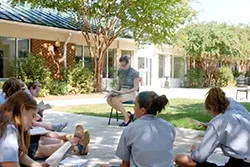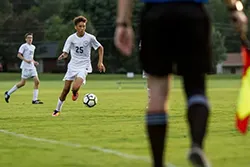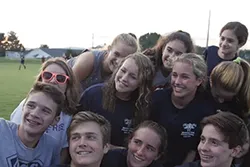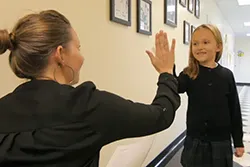Part II of a series by Kyle Alexander, Athletic Director
So you want to play in college?
Previously, Athletic Director Kyle Alexander published the first in a two-part article, listing do’s and don’ts for parents of athletes who want to play at the college level. Here’s a summary:
* Do encourage multi-sport children.
* Don’t specialize too early.
* Do encourage proper functional movement and a variety of activities.
* Don’t allow for improper training, inactivity, or early specialization.
* Do educate yourself about college athletics.
Below are his final five points for pursuing optimal athletic development for your children.
Don’t assume your child is a Division I athlete:
Division I colleges do offer athletic scholarships. In addition, some sports offer what is called a full grant and aid scholarship. However, keep in mind the percentage of athletes playing Division I sports like basketball and volleyball is 1.1%.
Do become informed about how each particular sport recruits athletes:
In some sports it comes down to numbers. For example, a college track coach can recruit based on the athlete’s time in the 400 meter race. Recruiting in team sports such as lacrosse, volleyball, basketball or soccer, isn’t going to be based on goals scored or numbers of kills in a high school career. College coaches know each athlete competes at a different level of competitive play, and numbers are relative to the opponent levels. For exposure to college coaches and the chance to be recruited, the high school athlete will need to attend camps and clinics that college coaches use for recruiting. Travel teams and teams that play in select tourneys attended by college coaches also offer exposure.
Don’t spend the entire summer and every weekend traveling for college exposure.
Too often the young athlete spends more time traveling, hanging out at the hotel or waiting for their team’s next game than with physical and sport training. Proper training and skill development must be a priority if playing in college is part of your child’s future. Ask experts and talk with college coaches to be informed.
Ask experts and talk with college coaches to be informed.
Don’t expect to be well-informed about college recruiting through media and parents on the travel team. Playing college athletics is a dream that can come true for the young athlete. As parents we should support our children by insisting they have a solid foundation for correct movement skills and functional strength. We can help achieve this by providing opportunities for a variety of sport skills and activities. Through it all, we should allow liberty for a child to pursue his or her passion and remain informed about the recruiting process along the way.





























